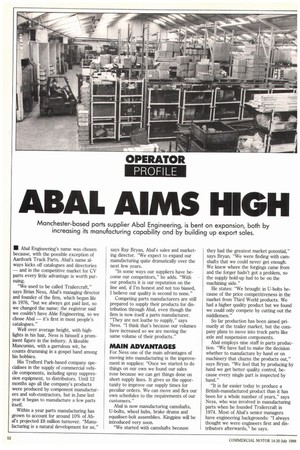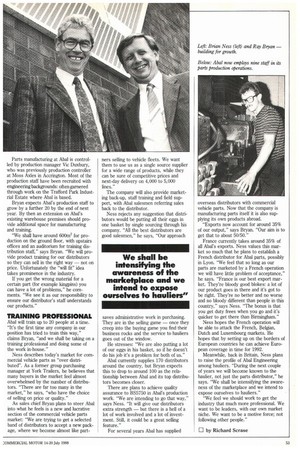ABAL AIMS HIGH
Page 38

Page 39

If you've noticed an error in this article please click here to report it so we can fix it.
• Abal Engineering's name was chosen because, with the possible exception of Aardvark Truck Parts, Abal's name always kicks off catalogues and directories — and in the competitive market for CV parts every little advantage is worth pursuing.
"We used to be called Trailercraft," says Brian Ness, Abal's managing director and founder of the firm, which began life in 1976, "but we always got paid last, so we changed the name; the registrar said we couldn't have Able Engineering, so we chose Abal — it's first in most people's catalogues."
Well over average height, with highlights in his hair, Ness is himself a prominent figure in the indusry. A likeable Mancunian, with a garrulous wit, he counts drumming in a gospel band among his hobbies.
His Trafford Park-based company specialises in the supply of commercial vehicle components, including spray suppression equipment, to distributors. Until 12 months ago all the company's products were produced by component manufacturers and sub-oontractors, but in June last year it began to manufacture a few parts itself.
Within a year parts manufacturing has grown to account for around 10% of Abal's projected £8 million turnover. "Manufacturing is a natural development for us," says Ray Bryan, Abal's sales and marketing director. "We expect to expand our manufacturing quite dramatically over the next few years.
"In some ways our suppliers have become our competitors," he adds. "With • our products it is our reputation on the line and, if I'm honest and not too biased, I believe our quality is second to none."
Competing parts manufacturers are still prepared to supply their products for distribution through Abal, even though the firm is now itself a parts manufacturer. "They are not loathe to supply," says Ness. "I think that's because our volumes have increased so we are moving the same volume of their products."
MAIN ADVANTAGES
For Ness one of the main advantages of moving into manufacturing is the improvement in supplies: "Once we started to do things on our own we found our sales rose because we can get things done on short supply lines. It gives us the opportunity to improve our supply times for peculiar orders. We can move and flex our own schedules to the requirements of our customers."
Abal is now manufacturing camshafts, U-bolts, wheel hubs, brake drums and equaliser-bolt assemblies. Kingpins will be introduced very soon.
"We started with camshafts because they had the greatest market potential," says Bryan. "We were finding with camshafts that we could never get enough. We knew where the forgings came from and the forger hadn't got a problem, so the supply hold-up had to be on the machining side."
He states: "We brought in U-bolts because of the price competitiveness in the market from Third World products. We had a higher quality product but we found we could only compete by cutting out the middlemen."
So far production has been aimed primarily at the trailer market, but the company plans to move into truck parts like axle and suspension components.
Abal employs nine staff in parts production. "We have had to make the decision whether to manufacture by hand or on machinery that churns the products out," says Bryan. "We feel that by producing by hand we get better quality control, because every single part is inspected by hand."
"It is far easier today to produce a British-manufactured product than it has been for a whole number of years," says Ness, who was involved in manufacturing parts when he founded Trailercraft in 1974. Most of Abal's senior managers have engineering backgrounds: "I always thought we were engineers first and distributors afterwards," he says. Parts manufacturing at Abal is controlled by production manager Vic Duxbury, who was previously production controller at Moss Axles in Accrington. Most of the production staff have been recruited with engineering backgrounds: often garnered through work on the Trafford Park Industrial Estate where Abal is based.
Bryan expects Abal's production staff to grow by a further 20 by the end of next year. By then an extension on Abal's existing warehouse premises should provide additional space for manufacturing and training.
"We shall have around 600m2 for production on the ground floor, with upstairs offices and an auditorium for training distribution staff," says Bryan. "We will provide product training for our distributors so they can sell in the right way — not on price. Unfortunately the "will fit" idea takes prominence in the industry.
If you get the wrong material for a certain part (for example kingpins) you can have a lot of problems," he comments. "We see it as our responsibility to ensure our distributor's staff understands our products."
TRAINING PROFESSIONAL
Abal will train up to 20 people at a time. "It's the first time any company in our position has tried to train this way," claims Bryan, "and we shall be taking on a training professional and doing some of the work in-house."
Ness describes today's market for commercial vehicle parts as "over distributed". As a former group purchasing manager at York Trailers, he believes that many buyers in the market feel almost overwhelmed by the number of distributors. "There are far too many in the market," he says, "who have the choice of selling on price or quality."
As sales chief Bryan plans to steer Abal into what he feels is a new and lucrative section of the commercial vehicle parts market: "We are trying to get a selected band of distributors to accept a new package, where we become almost like part ners selling to vehicle fleets. We want them to use us as a single source supplier for a wide range of products, while they can be sure of competitive prices and next-day delivery on 4,000 to 5,000 lines."
The company will also provide marketing back-up, staff training and field support, with Abal salesmen referring sales back to the distributor.
Ness rejects any suggestion that distributors would be putting all their eggs in one basket by single sourcing through his company. "All the best distributors are good salesmen," he says, "Our approach saves administrative work in purchasing. They are in the selling game — once they creep into the buying game you find their business rocks and the service to hauliers goes out of the window.
He stresses: "We are also putting a lot of our eggs in his basket, so if he doesn't do his job it's a problem for both of us."
Abal currently supplies 170 distributors around the country, but Bryan expects this to drop to around 100 as the relationship between Abal and its top distributors becomes closer.
There are plans to achieve quality assurance to BS5750 in Abal's production work. "We are intending to go that way," says Ness. "It will give our distributors extra strength — but there is a hell of a lot of work involved and a lot of investment. Still, it could be a great selling feature."
For several years Abal has supplied overseas distributors with commercial vehicle parts. Now that the company is manufacturing parts itself it is also supplying its own products abroad.
"Exports now account for around 35% of our output," says Bryan. "Our aim is to get that to about 50/50."
France currently takes around 35% of all Abal's exports. Ness values this market so much that he plans to establish a French distributor for Abal parts, possibly in Lyon. "We feel that so long as our parts are marketed by a French operation we will have little problem of acceptance," he says. "France is our best export market. They're bloody good blokes: a lot of our product goes in there and it's got to be right. They're no better and no worse and no bloody different than people in this country," says Ness. "The bonus is that you get duty frees when you go and it's quicker to get there than Birmingham."
Ness hopes the French operation will be able to attack the French, Belgian, Dutch and Luxembourg markets. He hopes that by setting up on the borders of European countries he can achieve European coverage in time for 1992.
Meanwhile, back in Britain, Ness plans to raise the profile of Abal Engineering among hauliers. "During the next couple of years we will become known to the haulier, not just the parts distributor," he says. "We shall be intensifying the awareness of the marketplace and we intend to expose ourselves to hauliers."
"We feel we should work to get the industry that much more professional. We want to be leaders, with our own market niche. We want to be a motive force; not following other people."














































